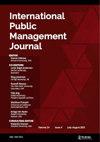心理资本与协同应急参与的关系:来自华人社区的证据
IF 3
3区 管理学
Q2 PUBLIC ADMINISTRATION
引用次数: 0
摘要
摘要促进合作生产在应急响应中至关重要。本研究将心理资本(PsyCap)的概念引入应急环境下的协同生产领域,并进一步实证研究了心理资本与参与协同生产应急响应的关系。采用物流回归方法对10个省级地区5721名中国社区受访者的数据进行了分析。结果表明,PsyCap与参与共同制定应急响应呈正相关。对社区防疫的熟悉对心理资本和参与共同制定应急响应之间的关系起到了积极的调节作用。对社区应急响应的满意度在PsyCap和参与共同制定应急响应之间的关系中起着完全的中介作用,而对社区应急反应的信任则起着部分中介作用。PsyCap公民的满意度越高,他们对社区防疫的满意度和信任度就越高,这进一步增加了居民参与共同制定疫情应急响应的程度。研究结果提供了经验证据,证明心理资本对于让公民参与共同制定应急响应至关重要。它还建议,应将增强公民特定心理资本维度纳入日常社区治理。本文章由计算机程序翻译,如有差异,请以英文原文为准。
Association of psychological capital and engagement in coproducing emergency response: evidence from Chinese communities
Abstract Promoting coproduction is critical in emergency responses. This study introduces the concept of psychological capital (PsyCap) to the field of coproduction within emergency context and further empirically investigates the association of PsyCap and engagement in coproducing emergency responses. Data collected from 5721 respondents in Chinese communities of 10 provincial regions were analyzed using logistics regression. The results demonstrate that PsyCap is positively associated with engagement in coproducing emergency responses. Familiarity with community epidemic prevention positively moderates the relationship between PsyCap and engagement in coproducing emergency responses. Satisfaction with community emergency response plays a full mediation role while trust in community emergency response plays a partial mediation role in the relationship between PsyCap and engagement in coproducing emergency responses. The higher the PsyCap citizens have, the more satisfaction and trust toward the community epidemic prevention they have, which further increases residents’ engagement in coproducing emergency response to the epidemic. The findings provide empirical evidences that PsyCap is essential for involving citizens in coproducing emergency responses. It also suggests that enhancing citizens’ specific PsyCap dimensions should be incorporated into routine community governance.
求助全文
通过发布文献求助,成功后即可免费获取论文全文。
去求助
来源期刊

International Public Management Journal
PUBLIC ADMINISTRATION-
CiteScore
5.30
自引率
11.50%
发文量
49
期刊介绍:
The International Public Management Journal (IPMJ) publishes high-quality empirical and theoretical work on managing large organizations, particularly public organizations. IPMJ features work from scholars around the world who conduct research in the areas of public management and government reform, comparative public administration, organizational theory, and organizational behavior. IPMJ seeks to provide a bridge between those conducting research on public management and public administration on the one hand, and those working in the areas of organizational behavior and organization theory on the other. IPMJ intends to stimulate and reflect the academic interests of an international constituency of readers and scholars.
 求助内容:
求助内容: 应助结果提醒方式:
应助结果提醒方式:


